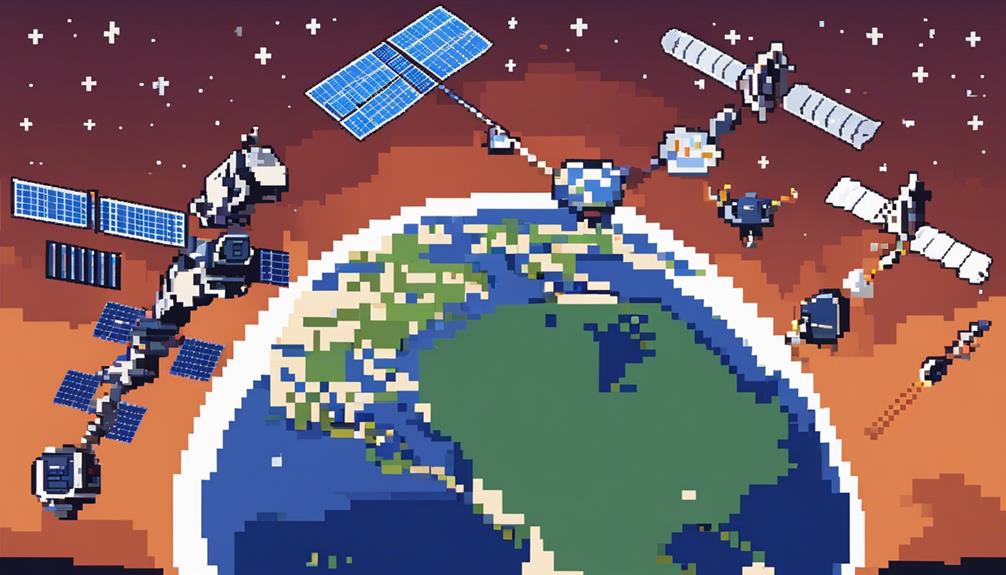In the competitive landscape of launch service providers, SpaceX finds itself amidst a diverse array of formidable competitors, each with distinct offerings and strategic approaches. As ABL Space Systems, Skyroot Aerospace, and Orbex intensify their focus on cutting-edge launch vehicle development, Firefly Aerospace, Rocket Lab, and Skyroot Aerospace position themselves as cost-effective alternatives. Moreover, the emergence of NewRocket, Vector Space Systems, and Orbex with innovative technologies adds complexity to the dynamic market. With established players like Blue Origin, Virgin Galactic, and United Launch Alliance in the mix, the interplay of strengths and strategies in this sector presents a compelling narrative of competition and innovation.
Key Takeaways
- Blue Origin and Rocket Lab innovate for cost-effective spaceflight.
- Northrop Grumman excels in government satellite launches and sensor technology.
- Arianespace leads in diverse rocket services and commercial launches.
- United Launch Alliance stands out in launching critical government payloads.
Blue Origin

Blue Origin, a space exploration company founded by Jeff Bezos, focuses on cost reduction in spaceflight and the exploration of the solar system. One of the key strategies employed by Blue Origin to achieve cost reduction is the development and utilization of reusable rockets. By designing rockets that can be launched multiple times, Blue Origin aims to significantly bring down the expenses associated with space missions. This focus on reusability aligns with the company's goal of making space travel more accessible and affordable, particularly in the realm of commercial space travel.
In line with its commitment to commercial space travel, Blue Origin has been actively working towards offering space tourism flights. The recent sale of a seat for $28 million demonstrates the company's progress in this area. By catering to individuals willing to pay for the experience of space travel, Blue Origin is tapping into a potentially lucrative market while also advancing the broader goal of making space travel a routine commercial activity.
Furthermore, Blue Origin's collaborations with prestigious organizations such as NASA, DARPA, US Space Force, and United Launch Alliance underscore the company's credibility and expertise in the space industry. These partnerships not only enhance Blue Origin's capabilities but also contribute to the overall advancement of space exploration technology. The successful completion of Blue Origin's first crewed test spaceflight in June 2021 marked a significant milestone for the company, showcasing its capabilities and commitment to pushing the boundaries of space exploration.
Rocket Lab
Rocket Lab, a private aerospace manufacturer and small satellite launch provider, has notably completed 21 mission flights since 2017. Specializing in launching small satellites into orbit, Rocket Lab has positioned itself as a key player in the aerospace industry. The company's revenue stood at $33 million in 2020, reflecting its growing presence in the market.
Despite its successes, Rocket Lab faced a setback in May 2021 when its Electron rocket failed to reach orbit. However, the company quickly rebounded, achieving a successful launch in July 2021. This ability to recover swiftly from failures demonstrates Rocket Lab's resilience and commitment to providing reliable launch services.
Competing directly with industry giants like SpaceX, Rocket Lab offers tailored solutions for small satellite launches. By focusing on this niche market, Rocket Lab has carved out a unique space for itself in the aerospace sector.
With a track record of successful missions and a dedication to innovation, Rocket Lab continues to attract customers looking to deploy small satellites into space. As the demand for small satellite launches grows, Rocket Lab remains well-positioned to capitalize on this trend and solidify its position as a leading launch service provider in the aerospace industry.
Virgin Galactic

Positioned as a key player in the aerospace industry alongside Rocket Lab, Virgin Galactic, founded by Richard Branson in 2004, focuses on offering space tourism experiences at a ticket price of $250,000.
Key Points:
- Commercial Operations: Despite facing a loss of $210 million in 2020, Virgin Galactic is gearing up to commence commercial operations in 2022. This move signifies the company's commitment to becoming a prominent player in the space tourism sector.
- Richard Branson's Space Flight: In June 2021, Richard Branson himself undertook a successful space flight aboard a Virgin Galactic spacecraft. This milestone not only showcased the company's capabilities but also generated significant public interest in their space tourism offerings.
- High-Value Transactions: Virgin Galactic has already secured a substantial booking, selling a seat for $28 million for an upcoming space tourism flight. This demonstrates the willingness of individuals to invest heavily in the unique experience that Virgin Galactic promises to deliver.
- Mission of Accessibility: Competing in the burgeoning space tourism industry, Virgin Galactic aims to democratize access to space travel by making it available to private individuals. By offering these experiences, Virgin Galactic is paving the way for a new era of space exploration and adventure.
United Launch Alliance (ULA)
United Launch Alliance (ULA) holds a competitive advantage in the space launch industry due to its long-standing reputation for reliability and experience in launching satellites. ULA's market share in the sector, particularly in military satellite launches, highlights its significance as a key player alongside SpaceX. Analyzing ULA's strengths and market positioning provides valuable insights into the dynamics of the launch service competition.
ULA's Competitive Advantage
Boasting a renowned track record in launching expensive military satellites, ULA, a joint venture between Boeing and Lockheed Martin, maintains a competitive edge in the space launch services market. ULA's expertise in Space Systems and rocket engines is evident in its successful satellite launches, particularly for government payloads. The company's dedication to reliability and precision has solidified its position as a key player in the industry, competing directly with SpaceX for lucrative US military contracts. ULA's recent accomplishment of launching the USSF12 payloads in June 2022 further showcases its technical prowess and competitive advantage in the market.
- ULA specializes in launching expensive military satellites.
- ULA's expertise in Space Systems and rocket engines is well-recognized.
- The company competes directly with SpaceX for national security launches.
- Recent successful launch of USSF12 payloads highlights ULA's competitive advantage.
ULA's Market Share
Having established itself as a formidable competitor in the space launch industry, ULA, a joint venture of Boeing and Lockheed Martin, commands a significant market share in the US launch sector. ULA's market share is prominent in both government and commercial space launch activities. With revenues of $2 billion in 2020, ULA competes with SpaceX for lucrative US military contracts. While known for its relatively expensive military satellite launches, ULA has a strong track record of successfully delivering critical government payloads into orbit. The recent launch of USSF12 payloads in June 2022 further solidified ULA's role in national security space missions. Employing around 2,500 staff, ULA remains a key player in the space launch market alongside SpaceX, contributing significantly to the industry's competitiveness and innovation.
Northrop Grumman

Northrop Grumman, a key player in the aerospace industry, boasts an extensive workforce and acquired Orbital ATK to bolster its space capabilities. Specializing in government satellite launches and defense-related projects, the company has developed advanced sensor payloads for military applications. Notably, Northrop Grumman has been chosen to manufacture cutting-edge Next-Gen OPIR geosynchronous satellites for high-level surveillance and reconnaissance missions.
Northrop's Launch Capabilities
With a focus on government satellite launches and a workforce exceeding 90,000 employees, Northrop Grumman's launch capabilities have been significantly bolstered by its acquisition of Orbital ATK in 2018. Northrop Grumman plays a vital role in commercial orbital and space transportation endeavors. The company's capabilities are reflected in several key projects and achievements:
- Specialization in government satellite launches.
- Development of sensor payload systems for the US Space Force.
- Selection to produce Next-Gen OPIR geosynchronous satellites.
- Focus on both commercial and government space ventures, positioning itself as a key competitor in the industry.
Competitive Advantages of Northrop
Renowned for its expertise in government satellite launches and bolstered by the acquisition of Orbital ATK in 2018, Northrop Grumman stands as a leading aerospace company at the forefront of space technology advancements. Competing vigorously in both commercial and government space ventures, Northrop Grumman holds several competitive advantages that set it apart in the industry.
| Competitive Advantages of Northrop | |
|---|---|
| 1. Expertise in Government Satellite Launches | Northrop Grumman is well-known for its proficiency in launching government satellites. |
| 2. Acquisition of Orbital ATK | The acquisition of Orbital ATK in 2018 expanded Northrop Grumman's capabilities in the aerospace sector. |
| 3. Focus on Sensor Payload Development | The company's focus on developing sensor payloads for the US Space Force enhances its offerings. |
| 4. Next-Gen OPIR Geosynchronous Satellites | Northrop Grumman has been selected to produce advanced Next-Gen OPIR geosynchronous satellites. |
| 5. Competition in Commercial and Government Sectors | Competing with SpaceX, Northrop Grumman offers a diverse range of space technologies and services. |
Arianespace
Arianespace's extensive experience and diverse rocket fleet position it as a formidable competitor in the global commercial space launch market. Here are four key points highlighting Arianespace's competitive edge:
- Pioneering Commercial Launch Services: Arianespace holds the distinction of being the first company to offer commercial launch services globally. This early entry into the commercial space launch sector has allowed Arianespace to establish a strong foothold and reputation in the industry.
- Robust Launch Portfolio: Operating a fleet of rockets including the Ariane 5, Soyuz-2, and Vega, Arianespace has demonstrated versatility in catering to a wide range of payloads and mission requirements. This diverse rocket fleet enables Arianespace to effectively serve the needs of various clients and launch scenarios.
- Proven Track Record: With a history of over 850 satellites launched over 41 years, Arianespace's track record speaks to its reliability and success in the field of commercial space launches. In 2020 alone, the company conducted 10 successful launches, showcasing its proficiency and experience.
- Financial Performance: Arianespace's financial strength is underscored by its $1.2 billion in revenues generated in 2020. This robust financial performance reflects the company's competitiveness and sustainability in the commercial space launch market.
Astranis

Astranis, a satellite internet startup based in San Francisco, California, is strategically positioned to revolutionize global broadband access through the deployment of small geostationary satellites. Founded in 2015, Astranis aims to address the lack of internet coverage in underserved regions by launching these innovative satellites. The company's mission involves providing affordable high-speed internet to areas where traditional infrastructure is limited or nonexistent.
By utilizing small geostationary satellites, Astranis can offer reliable internet coverage to a wide range of locations across the globe. These satellites, designed specifically for delivering internet services, have the capability to significantly enhance connectivity in remote or rural areas. Astranis's approach of leveraging geostationary satellites demonstrates a commitment to overcoming the challenges associated with expanding broadband access in hard-to-reach areas.
Backed by notable investors such as Andreessen Horowitz and Y Combinator, Astranis has secured the financial support necessary to advance its satellite internet initiatives. The company's strategic focus on satellite technology and internet connectivity positions it as a key player in the quest to bridge the digital divide and bring reliable broadband access to underserved communities worldwide.
Space Adventures
Facilitating exclusive spaceflights for high-net-worth individuals, Space Adventures is a pioneering space tourism company that specializes in arranging private missions to the International Space Station (ISS). Founded in 1998, the company has a rich history of enabling private citizens to experience space travel firsthand. Here are some key points about Space Adventures:
- Private Spaceflights: Space Adventures offers individuals the opportunity to travel to space through private missions, providing a unique and exclusive experience for those who can afford it.
- International Space Station Missions: The company has organized multiple missions to the International Space Station, allowing private citizens to live and work aboard the orbiting laboratory.
- Training Programs: Space Adventures goes beyond the launch itself, offering training programs such as spacewalk training and zero-gravity flights to prepare participants for the challenges of space travel.
- Notable Participants: Space Adventures has successfully sent notable individuals like Dennis Tito, Guy Laliberté, and Anousheh Ansari to space, further establishing its reputation in the space tourism industry.
With a track record of enabling private individuals to venture into space and a focus on providing high-quality, tailored space travel experiences, Space Adventures continues to be a prominent player in the commercial space sector, catering to those with a taste for adventure and a willingness to explore the cosmos.
Society of European Satellites (SES)

Specializing in global satellite communication solutions, the Luxembourg-based operator SES manages an extensive fleet of geostationary and medium Earth orbit satellites to deliver high-quality video content, broadband connectivity, and data services to a diverse range of customers. SES plays a crucial role in the aerospace industry by providing advanced satellite communication services to broadcasters, content providers, internet service providers, mobile and fixed network operators, governments, and institutions worldwide.
| SES Overview | |
|---|---|
| Headquarters | Luxembourg |
| Satellite Fleet | 50+ geostationary, 20+ medium Earth orbit |
| Services Provided | Video content, broadband connectivity, data services |
| Industry Presence | Strong collaboration with partners for technology advancement |
SES's commitment to innovation and quality has established it as a key player in the satellite communication sector. The company provides reliable and secure space missions that cater to various communication needs, ensuring seamless connectivity for its global clientele. Through its continuous efforts to enhance satellite technologies and services, SES remains at the forefront of delivering cutting-edge solutions for a connected world.
Frequently Asked Questions
Who Is Spacex's Biggest Competitor?
In the realm of space launches, Blue Origin stands out as a formidable contender to SpaceX. They have partnered with reputable entities like NASA, DARPA, US Space Force, and United Launch Alliance, consolidating their position in the industry. Additionally, Blue Origin's recent successful crewed test spaceflight in June 2021 has further emphasized their capabilities. With a focus on space tourism and exploration, Blue Origin presents a significant challenge to SpaceX's dominance.
Is Northrop Grumman a Competitor to Spacex?
Northrop Grumman is a significant player in the aerospace industry, focusing on launch services, space exploration partnerships, and government satellite launches. The company's collaboration in advanced space missions, such as producing Next-Gen OPIR geosynchronous satellites, showcases its capabilities. While Northrop Grumman competes with various companies in the sector, its emphasis on government contracts and space technologies positions it as a key player in the industry, particularly in the realm of launch services and space exploration partnerships.
Who Is Amazon Competitors With Spacex?
In the space launch industry, Blue Origin, a company founded by Jeff Bezos, competes with SpaceX. Blue Origin collaborates with notable entities such as NASA, DARPA, US Space Force, and United Launch Alliance. One of Blue Origin's projects, the Boeing Starliner, represents a key player in the space launch market. Blue Origin's recent successful crewed test spaceflight in June 2021 has positioned the company as a robust competitor to SpaceX in the realm of space exploration and tourism.
Are NASA and Spacex Rivals?
NASA and SpaceX are not rivals but rather strategic partners in the space race. Their collaboration has propelled commercial spaceflight opportunities, leading to advancements like the Crew Dragon spacecraft and Starship lunar lander. While both entities may compete for contracts, the overall synergy between NASA and SpaceX has been pivotal in achieving mutual goals and driving innovation in space exploration. Their strong working relationship showcases the potential for fruitful collaborations in the aerospace industry.
